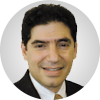Comedian Stephen Colbert, of the TV show "The Colbert Report" coined the word truthiness on Oct. 17, 2005.1 Truthiness, which was the Merriam-Webster word of the year in 2006, is defined as: "Truth that comes from the gut, not books," and "The quality of preferring concepts or facts one wishes to be true, rather than concepts or facts known to be true."2
The only evidence this student needed, in his opinion, that vaccines caused autism was anecdotal. The anecdotes were from the one person he knew whose vaccinated children were autistic and whose unvaccinated child was not. Yet he denied this was an anecdote. He said this was all the research he needed to know. The student just knew that vaccines cause autism. How did he know? His gut told him. That's truthiness.
I have encountered truthiness before. I had a conversation with a chiropractor about the biomechanics research that shows that the line of drive of an adjustment should be 90 degrees to the skin; otherwise, one just wastes energy stretching the skin.3,4 The doctor with whom I was speaking said that this research was invalid. I asked what was wrong with it and she said she'd never heard of it before and thus never read it. However, she knew it was invalid. I asked how she knew. She said because it just couldn't be valid. She knows how getting the right angle "sets" the vertebra.
I posed a hypothetical situation to her. What if researchers at each and every chiropractic college each did 20 studies and they all showed that one cannot control the direction the vertebra will move with an adjustment? Her response was that it wouldn't matter because she still knows it works. This is also pure truthiness.
Colbert suggested that truthiness is a characteristic of less intelligent or less thoughtful people because one does not find the truthiness in a book. The social scientist Jay Stuart Snelson calls the resistance to change one's paradigm "ideological immunity." According to Shermer, Snelson noted that ideological immunity is actually found in more intelligent people.5 "Educated, intelligent, and successful adults rarely change their most fundamental presuppositions. ... That is, the higher the IQ, the greater the potential for ideological immunity."
An example of ideological immunity can be found in a story about Harry Houdini and Sir Arthur Conan Doyle, the author of Sherlock Holmes.6 Sir Arthur was a believer in spiritualism. He believed in spirits, seances and mediums. Houdini put together an illusion to show Doyle that one cannot necessarily believe what one sees. The illusion involved Doyle writing something on a piece of paper, but not showing it to anyone. He then selected among a bowl of cork balls. He had previously cut a randomly chosen ball in half, which showed him that the ball was made of nothing but cork. Doyle dipped the cork ball in paint and put the ball on a slate he had suspended from the ceiling. Without touching it, the ball rolled over the slate to spell out the words that Sir Arthur had written on the paper.
Houdini told Doyle that there was nothing supernatural about what had been done. He assured Doyle that it was done by trickery, which he wouldn't explain. However, Sir Arthur was positive that Houdini accomplished this trick by psychic aid and could not be convinced otherwise. When it came to almost anything, except for spiritualism, Doyle was a well-known skeptic and thinker. However, as Snelson suggested, those with higher intelligence may have a greater propensity for ideological immunity and can lose their propensity for thinking critically.7
I have previously discussed the ethics of credulity on a practitioner's part as a violation of their fidelity duty. Patients have faith in us (credat emptor), so they expect that what we tell them is more than just our beliefs. They expect it to actually be true.8 Truthiness can be a violation of one's veracity duty. Here are two ways that the student who wrote the paper on vaccines could express his belief that vaccinations are the cause of autism: 1. Vaccinations are a cause of autism. 2. All the scientific evidence I have read says that vaccines are not the cause of autism. However, I don't believe the science. I know in my gut that they are the cause of autism. Plus, I've seen all the data I need in just one family.
I doubt he would use #2, even though that is the honest answer. The first response is more likely what he would say. Clearly, that answer is full of truthiness, but not truth.
References
- "The Colbert Report," Oct. 17, 2005. Origin of the word truthiness.
- Definition of truthiness. Merriam-Webster dictionary. www.merriam-webster.com/info/06words.htm.
- Bereznick DE, Ross JK, McGill SM. The frictional properties at the thoracic skin-fascia interface: implications in spine manipulation. Clin Biomech (Bristol, Avon), 2002 May;17(4):297-303.
- Kawchuk GN, Perle SM. The relation between the application angle of spinal manipulative therapy (SMT) and resultant vertebral accelerations in an in situ porcine model. Man Ther; in press.
- Shermer M. Why People Believe Weird Things: Pseudoscience, Superstition, and Other Confusions of Our Time. San Francisco: WH Freeman & Co; 1998, pp. 59-90.
- Polidoro M. Houdini's impossible demonstration. Skeptical Inquirer, 2006;30(4):20-1.
- Bensley DA. Why great thinkers sometimes fail to think critically. Skeptical Inquirer, 2006;30(4):37-52.
- Perle S. "Credat Emptor." Dynamic Chiropractic, 2003;21(1).
Click here for previous articles by Stephen M. Perle, DC, MS.





